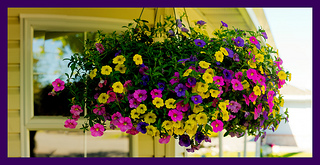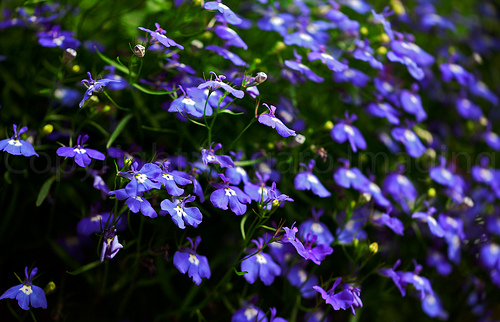How to Create Beautiful Hanging Baskets

Planting up hanging baskets is such a lovely way to relax and the best thing about it is that you end up with a gorgeous display of plants and flowers…if you do it right that is!
Many non-gardeners look on with admiration and envy at stunning, lush displays hanging outside other people’s homes and businesses. How do they do that? Why is there display so lush and so vibrant? What is their secret?

The first thing to address if you want to create a lovely hanging basket or two is your vessels…buy good quality baskets with an integral liner. The liner is to stop the compost from leaking out and also to help preserve moisture so that when you water your basket, your efforts won’t be wasted!
Choosing which kind of plants to grow in a hanging basket is also important. Certain plants and flowers are suitable for hanging displays whilst others are not.
Trailing varieties and those with smaller blooms are best for baskets; sunflowers and other tall, sturdy flowers are no use! You need flowers which creep, climb, trail and hang.
Mixing tiny flowers with medium works well as does putting blooms together with ivy or other trailers. You can grow some flowers from seeds in pots and then transfer the seedlings to your basket or buy seedlings and small plants commercially and pop them straight in.
The main rule of thumb when planting up, is to cram it as full as possible without damaging roots. Water your seedlings or plants well before planting them up and the same goes for your basket of compost…make sure the compost is nice and damp.
You will need the following:
Place the basket onto an old bucket and make sure the chain or rope is hanging outside the basket. Put in a layer of soaked moss..around three inches thick and on top of this, place a square of plastic sheeting (you can cut up an old, thick bag). Next add some water retaining gel to your compost and place a layer of compost on top of the moss and plastic.
You can now add your first layer of plants. Trailing Lobelia make a good first layer…push the fronds through the holes int he wire basket. When you have arranged around 6 plants to your liking, you can add another layer of moss, let some of it fall through the wire gaps…it will turn green as the basket matures.
Now put in a second layer of plastic and another layer of compost. The next layer of Trailing Lobelia can be made up of 5 plants, gently ease them through the gaps in the wire…try not to damage the leaves.
Now another layer of moss should be added and after that, more compost. Now it is time to add in the last layer of plants; you can choose anything which is pretty…Geraniums or Fuchsias look great with Lobelia. Plant the last layer with enough compost tucked in between each plant so that their roots can establish themselves well.
Water the finished basket well and hang it in a bright spot. Hanging baskets drink a lot of water and you need to ensure that they don’t dry out if you want a beautiful display.

You can consider the following to be good choices for beginners as they are relatively hardy and don’t require much care.
